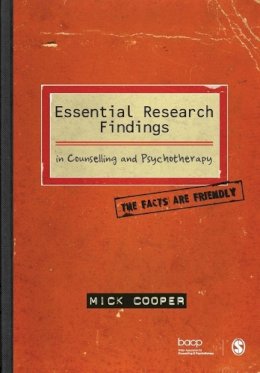Mick Cooper is Professor of Counselling Psychology at the University of Roehampton, where he is Director of the Centre for Research in Social and Psychological Transformation (CREST). Mick is a chartered psychologist, a UKCP registered psychotherapist, and a Fellow of the BACP. Mick is author and editor of a range of texts on person-centred, existential and relational approaches to therapy; including Working at Relational Depth in Counselling and Psychotherapy (2005, SAGE, with Dave Mearns), Pluralistic Counselling and Psychotherapy 2011, SAGE, with John McLeod) and Existential Therapies (2nd edn, 2017, SAGE). Mick has led a series of research studies exploring the processes and outcomes of humanistic counselling with young people. Mick is the father of four children and lives in Brighton on the south coast of England.
" In many ways, this book is a remarkable achievement. Mick Cooper succeeds admirably in his principle aim of providing "a user-friendly introduction to research findings in therapy" and also in his further aim of writing a book which is "accessible to all and oriented towards practice" .He has done a phenomenal job in reviewing vast amounts of material which he has digested and integrated in an attempt to answer various questions which researchers have asked, and he has drawn out the "implications for practice". I am also very impressed with the easy way in which he introduces necessary statistical concepts such as Cohen′s d (effect size) and ED 50 (median effective ′dose′). I also like the way in which he encourages thought and debate with his ′Questions for Reflection′ at the end of each chapter. Mick Cooper is a very engaging writer and it′s hard not to love this book" Journal of The Society for Existential Analysis "This is an interesting book that will appeal to a wide-ranging audience as it brings together, in a clear and accessible manner, the best available research with clinical expertise, to address the important question of whether psychotherapy helps people make changes and if so, how. It is definitely worth reading." Person-Centered and Experiential Psychotherapies, 2010 "Mick Cooper′s book is an ambitious endeavour, beautifully executed and an easy read...[it] is a brave, complex venture made readily digestible. It is well worth not just reading but using." British Journal of Guidance & Counselling, May 2010 "This unique and excellent book from Mick Cooper is a gem right down to its thoughtful and tantalizing cover...Mick Cooper has risen to the challenge of giving us a research findings text that is respectful of a wide range of therapies and is accessible to anyone within the profession. It′s a cliche, but this book should be on the shelf of any therapist interested in good, research-based, practice. The sub-title certainly held true for me. The facts really are friendly." International Transactional Analysis News, 2010 "Mick Cooper′s book cuts through the often hyperbolic claims and counter claims of the psychological therapies and has produced a clear guide to the current state of knowledge about what works. Summarising and describing effectively the key findings from the field, his guide is essential reading for practitioners, service providers and people who want evidence to support their choice of therapist." Jonathan Coe, Chief Executive, Witness "Beautifully done - clear and to the point. The book separates the wheat from the chaff wonderfully well." David Cain, editor of Humanistic Psychotherapies: Handbook of Research and Practice (PCCS Books, 2002) "READ THIS BOOK! This is an excellent account of all the core issues in therapy research." Norman Claringbull, What is counselling and psychotherapy? (Learning Matters, 2010) "Essential reading for trainers, trainees, practitioners and those involved in counselling and psychotherapy research...The success of Cooper’s work lies in its clarity, accessibility and user friendliness. In each chapter key points are summarised. Technical terms highlighted, recommended reading indicated and implications for practice signposted." Andy Hill, Senior Lecturer in Counselling at the University of Salford and Primary Care Psychological Therapist for Bolton PCT "So well written and laid out that it makes a rattling good read...Every counsellor and therapist should have a copy of this book" Eisteach, Irish Association for Counselling and Psychotherapy "Fantastic...it will definitely be recommended reading for our students" Dr. Darren Langdridge, The Open University "A phenomenal book" Scott D. Miller, Ph.D., Co-founder of the Centre for Clinical Excellence "Research reports do not usually make for riveting reading, so I had expected this book to be rather dry. However, nothing could be further from the truth as Mick Cooper has managed to create a text that is interesting and informative as well as engaging...certainly deserves a place on every counsellor and psychotherapist’s bookshelf" Therapy Today, March 2009 "Hard to put down...a superb job in drawing together such a wide body of information and synthesizing it in a manner that regular ′Joes′ like me can understand." Bill Matthews, Trainer and Therapist "A great contribution to the literature." Colin Lago "A great resource for therapists and a tremendous achievement to have pullled all this often complex information together in such an accessible way." Joe Armstrong, Lecturer in Counselling, University of Abertay "A remarkable summary of findings and their implications for practice as we enter the 21st century." Prof Michael J. Lambert, Brigham Young University "A fantastic accomplishment. Mick Cooper brings together a vast amount of material in a relevant and interesting way." Prof John McLeod, Professor of Counselling, University of Abertay Dundee ′The publication of this book couldn’t be more timely… Mick Cooper has a wonderful ability to write about complex things in a clear accessible way" Laurie Clark, CEO of British Association for Counselling and Psychotherapy Easier to digest than a large box of chocolates.
Gill Jackman

